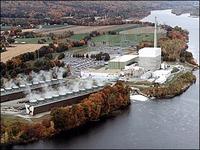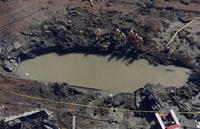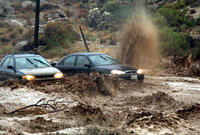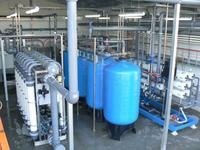-
Molecules could help solve radioactive waste concerns
One component of nuclear waste — called “minor actinides” — present an extreme hazard as they are intensely radioactive and long-lived nuclides; they must be safely stored for at least 100,000 years; researchers have discovered a class of molecules that can selectively extract minor actinides, making the eventual waste far less radiotoxic
-
-
Artificial volcanoes to reverse global warming

British scientists are investigating a method to reverse the effects of climate change by creating an artificial volcano and suspending it 12.5 miles above the earth; the team’s goal is to recreate the cooling effect that a volcano has when it releases millions of tiny particles into the stratosphere that bounce some of the Sun’s rays back into space
-
-
Teams dispatched to inspect Vermont nuclear plant following Irene

Following the torrential rains from Hurricane Irene on Sunday, federal officials have dispatched inspection teams to examine the aging Vermont Yankee nuclear plant to ensure that the plant has not been compromised; the plant has the same design as the Fukushima Daiichi plant in Japan which suffered a partial meltdown following the 11 March earthquake and tsunami
-
-
Report finds poor management cause of San Bruno natural gas explosion

An investigation into the cause of a natural gas pipeline explosion that killed eight people and destroyed dozens of homes in San Bruno, California, placed the blame squarely on fifty-four years of bad management by Pacific Gas & Electric Company (PG&E) and the failure of state and federal regulators to notice the problem
-
-
Automated flash-flood phone alert system developed

A part of Texas is called Flash Flood Alley because of the frequency and ferocity of flash floods; it stretches from San Antonio through Austin and to Dallas, and includes the Fort Hood military base; researchers develop a system which uses cell phones to give real-time text alerts of flash floods in the area
-
-
Breakthrough in hydrogen fuel cells

Hydrogen makes a great fuel because it can be converted easily to electricity in a fuel cell and because it is carbon free; the downside of hydrogen is that, because it is a gas, it can only be stored in high pressure or cryogenic tanks; a team of USC scientists has developed a robust, efficient method of using hydrogen as a fuel source
-
-
DRC wins DHS contract to help protect federal, state, and local agencies
On Tuesday Dynamics Research Corporation (DRC) announced that it had won a new blanket purchase agreement with the General Services Administration and DHS to provide a range of support services to federal, state, and local government agencies
-
-
New York's older brick buildings vulnerable

To get a better idea of just how much damage even a moderate earthquake would cause to unreinforced masonry buildings, earthquae-engineering researchers are reconstructing brick walls like those in New York City buildings that are approximately 100 years old
-
-
Wastewater recycling adds to greenhouse gas emissions

New research shows that wastewater recycling processes may generate more greenhouse gases than traditional water-treatment processes; still, there are good reasons to continue keep wastewater recycling among the water-resource tools for urban areas
-
-
Uncovering mechanisms key to fusion reactor walls
A new tool will be hitched to an experimental fusion reactor at Princeton University to learn precisely what happens when extremely hot plasmas touch and interact with the inner surface of the reactor; fusion powers the stars and could lead to a limitless supply of clean energy
-
-
DRC wins DHS contract to help protect federal, state, and local agencies
On Tuesday Dynamics Research Corporation (DRC) announced that it had won a new blanket purchase agreement with the General Services Administration and DHS to provide a range of support services to federal, state, and local government agencies
-
-
Virginia quake highlights overlooked danger: decrepit dams
Tuesday’s Virginia earthquake raised fears that a Fukushima scenario would unfold somewhere on the East Coast, but experts say that earthquake pose a much greater threat: breaching decrepit dams; of the 85,000 dams in the United States, 4,000 are seriously unsafe or deficient — and of those, 1,800 are located in areas where a breach would cause grave damage to life and property
-
-
U.S. makes nuclear fuel available to other countries
The United States announced the availability of a reserve stockpile of low-enriched uranium (LEU) for use in nuclear fuel; the LEU is derived from down-blended surplus military material; the LEU will be made available to countries interested in nuclear power generation, thus making it unnecessary for these countries to develop their own uranium-enrichment technology
-
-
Thermopower waves advance a new energy future
Thermopower waves in thermoelectric materials can convert heat from solid fuels into electrical energy, in research that advances the vision of “smartdust” and other truly autonomous micro and nanomachines; “smartdust” systems are micro-electromechanical systems that are networked wirelessly for sensing and receiving data, for example testing pH of soil in large agricultural fields or quality of water reserves
-
-
Water mist puts out fires at low pressure
A new water mist system allows for fires to be extinguished from a distance of eight meters; the system’s special nozzles generate a fine mist of tiny water droplets; the water and the propellant nitrogen are non-hazardous, environmentally friendly, and leave no residues
-
More headlines
The long view
Water Wars: A Historic Agreement Between Mexico and US Is Ramping Up Border Tension
As climate change drives rising temperatures and changes in rainfall, Mexico and the US are in the middle of a conflict over water, putting an additional strain on their relationship. Partly due to constant droughts, Mexico has struggled to maintain its water deliveries for much of the last 25 years, deliveries to which it is obligated by a 1944 water-sharing agreement between the two countries.
Trump Is Fast-Tracking New Coal Mines — Even When They Don’t Make Economic Sense
In Appalachian Tennessee, mines shut down and couldn’t pay their debts. Now a new one is opening under the guise of an “energy emergency.”
Smaller Nuclear Reactors Spark Renewed Interest in a Once-Shunned Energy Source
In the past two years, half the states have taken action to promote nuclear power, from creating nuclear task forces to integrating nuclear into long-term energy plans.
Keeping the Lights on with Nuclear Waste: Radiochemistry Transforms Nuclear Waste into Strategic Materials
How UNLV radiochemistry is pioneering the future of energy in the Southwest by salvaging strategic materials from nuclear dumps –and making it safe.
Model Predicts Long-Term Effects of Nuclear Waste on Underground Disposal Systems
The simulations matched results from an underground lab experiment in Switzerland, suggesting modeling could be used to validate the safety of nuclear disposal sites.
